This action will force synchronization from dotNET China/MiniExcel, which will overwrite any changes that you have made since you forked the repository, and can not be recovered!!!
Synchronous operation will process in the background and will refresh the page when finishing processing. Please be patient.
- Introduction
- Features
- Get Started
- Installation
- Release Notes
- TODO
- Performance
- Excel Query/Import
- 1. Execute a query and map the results to a strongly typed IEnumerable [Try it]
- 2. Execute a query and map it to a list of dynamic objects without using head [Try it]
- 3. Execute a query with first header row [Try it]
- 4. Query Support LINQ Extension First/Take/Skip ...etc
- 5. Query by sheet name
- 6. Query all sheet name and rows
- 7. Get Columns
- 8. Dynamic Query cast row to IDictionary<string,object>
- 9. Query Excel return DataTable
- 10. Specify the cell to start reading data
- 11. Fill Merged Cells
- 12. Reading big file by disk-base cache (Disk-Base Cache - SharedString)
- Create/Export Excel
- 1. Anonymous or strongly type [Try it]
- 2. IEnumerable<IDictionary<string, object>>
- 3. IDataReader
- 4. Datatable
- 5. Dapper Query
- 6. SaveAs to MemoryStream [Try it]
- 7. Create Multiple Sheets
- 8. TableStyles Options
- 9. AutoFilter
- 10. Create Image
- 11. Byte Array File Export
- 12. Merge same cells vertically
- 13. Skip null values
- Fill Data To Excel Template
- Excel Column Name/Index/Ignore Attribute
- 1. Specify the column name, column index, column ignore
- 2. Custom Format (ExcelFormatAttribute)
- 3. Set Column Width(ExcelColumnWidthAttribute)
- 4. Multiple column names mapping to the same property.
- 5. System.ComponentModel.DisplayNameAttribute = ExcelColumnName.excelColumnNameAttribute
- 6. ExcelColumnAttribute
- 7. DynamicColumnAttribute
- Add, Delete, Update
- Excel Type Auto Check
- CSV
- DataReader
- Async
- Others
- Examples:
- FAQ
- Q: Excel header title not equal class property name, how to mapping?
- Q. How to query or export multiple-sheets?
- Q. Whether to use Count will load all data into the memory?
- Q. How does Query use integer indexs?
- Q. No title empty excel is generated when the value is empty when exporting Excel
- Q. How to stop the foreach when blank row?
- Q. How to remove empty rows?
- Q. How SaveAs(path,value) to replace exists file and without throwing "The file ...xlsx already exists error"
- Limitations and caveats
- Reference
- Thanks
- Contributors
Introduction
MiniExcel is simple and efficient to avoid OOM's .NET processing Excel tool.
At present, most popular frameworks need to load all the data into the memory to facilitate operation, but it will cause memory consumption problems. MiniExcel tries to use algorithm from a stream to reduce the original 1000 MB occupation to a few MB to avoid OOM(out of memory).

Features
- Low memory consumption, avoid OOM (out of memory) and full GC
- Support
real-timeoperation of each row of data - Support LINQ deferred execution, it can do low-consumption, fast paging and other complex queries
- Lightweight, without Microsoft Office installed, no COM+, DLL size is less than 150KB
- Easy API style to read/write/fill excel
Get Started
Installation
You can install the package from NuGet
Release Notes
Please Check Release Notes
TODO
Please Check TODO
Performance
Benchmarks logic can be found in MiniExcel.Benchmarks , and test cli
dotnet run -p .\benchmarks\MiniExcel.Benchmarks\ -c Release -f netcoreapp3.1 -- -f * --join
Output from the latest run is :
BenchmarkDotNet=v0.12.1, OS=Windows 10.0.19042
Intel Core i7-7700 CPU 3.60GHz (Kaby Lake), 1 CPU, 8 logical and 4 physical cores
[Host] : .NET Framework 4.8 (4.8.4341.0), X64 RyuJIT
Job-ZYYABG : .NET Framework 4.8 (4.8.4341.0), X64 RyuJIT
IterationCount=3 LaunchCount=3 WarmupCount=3
Benchmark History : Link
Import/Query Excel
Logic : Test1,000,000x10.xlsx as performance test basic file, 1,000,000 rows * 10 columns "HelloWorld" cells, 23 MB file size
| Library | Method | Max Memory Usage | Mean |
|---|---|---|---|
| MiniExcel | 'MiniExcel QueryFirst' | 0.109 MB | 0.0007264 sec |
| ExcelDataReader | 'ExcelDataReader QueryFirst' | 15.24 MB | 10.66421 sec |
| MiniExcel | 'MiniExcel Query' | 17.3 MB | 14.17933 sec |
| ExcelDataReader | 'ExcelDataReader Query' | 17.3 MB | 22.56508 sec |
| Epplus | 'Epplus QueryFirst' | 1,452 MB | 18.19801 sec |
| Epplus | 'Epplus Query' | 1,451 MB | 23.64747 sec |
| OpenXmlSDK | 'OpenXmlSDK Query' | 1,412 MB | 52.00327 sec |
| OpenXmlSDK | 'OpenXmlSDK QueryFirst' | 1,413 MB | 52.34865 sec |
| ClosedXml | 'ClosedXml QueryFirst' | 2,158 MB | 66.18897 sec |
| ClosedXml | 'ClosedXml Query' | 2,184 MB | 191.43412 sec |
Export/Create Excel
Logic : create a total of 10,000,000 "HelloWorld" excel
| Library | Method | Max Memory Usage | Mean |
|---|---|---|---|
| MiniExcel | 'MiniExcel Create Xlsx' | 15 MB | 11.53181 sec |
| Epplus | 'Epplus Create Xlsx' | 1,204 MB | 22.50971 sec |
| OpenXmlSdk | 'OpenXmlSdk Create Xlsx' | 2,621 MB | 42.47399 sec |
| ClosedXml | 'ClosedXml Create Xlsx' | 7,141 MB | 140.93992 sec |
Excel Query/Import
1. Execute a query and map the results to a strongly typed IEnumerable [Try it]
Recommand to use Stream.Query because of better efficiency.
public class UserAccount
{
public Guid ID { get; set; }
public string Name { get; set; }
public DateTime BoD { get; set; }
public int Age { get; set; }
public bool VIP { get; set; }
public decimal Points { get; set; }
}
var rows = MiniExcel.Query<UserAccount>(path);
// or
using (var stream = File.OpenRead(path))
var rows = stream.Query<UserAccount>();

2. Execute a query and map it to a list of dynamic objects without using head [Try it]
- dynamic key is
A.B.C.D..
| MiniExcel | 1 |
|---|---|
| Github | 2 |
var rows = MiniExcel.Query(path).ToList();
// or
using (var stream = File.OpenRead(path))
{
var rows = stream.Query().ToList();
Assert.Equal("MiniExcel", rows[0].A);
Assert.Equal(1, rows[0].B);
Assert.Equal("Github", rows[1].A);
Assert.Equal(2, rows[1].B);
}
3. Execute a query with first header row [Try it]
note : same column name use last right one
Input Excel :
| Column1 | Column2 |
|---|---|
| MiniExcel | 1 |
| Github | 2 |
var rows = MiniExcel.Query(useHeaderRow:true).ToList();
// or
using (var stream = File.OpenRead(path))
{
var rows = stream.Query(useHeaderRow:true).ToList();
Assert.Equal("MiniExcel", rows[0].Column1);
Assert.Equal(1, rows[0].Column2);
Assert.Equal("Github", rows[1].Column1);
Assert.Equal(2, rows[1].Column2);
}
4. Query Support LINQ Extension First/Take/Skip ...etc
Query First
var row = MiniExcel.Query(path).First();
Assert.Equal("HelloWorld", row.A);
// or
using (var stream = File.OpenRead(path))
{
var row = stream.Query().First();
Assert.Equal("HelloWorld", row.A);
}
Performance between MiniExcel/ExcelDataReader/ClosedXML/EPPlus

5. Query by sheet name
MiniExcel.Query(path, sheetName: "SheetName");
//or
stream.Query(sheetName: "SheetName");
6. Query all sheet name and rows
var sheetNames = MiniExcel.GetSheetNames(path);
foreach (var sheetName in sheetNames)
{
var rows = MiniExcel.Query(path, sheetName: sheetName);
}
7. Get Columns
var columns = MiniExcel.GetColumns(path); // e.g result : ["A","B"...]
var cnt = columns.Count; // get column count
8. Dynamic Query cast row to IDictionary<string,object>
foreach(IDictionary<string,object> row in MiniExcel.Query(path))
{
//..
}
// or
var rows = MiniExcel.Query(path).Cast<IDictionary<string,object>>();
9. Query Excel return DataTable
Not recommended, because DataTable will load all data into memory and lose MiniExcel's low memory consumption feature.
var table = MiniExcel.QueryAsDataTable(path, useHeaderRow: true);

10. Specify the cell to start reading data
MiniExcel.Query(path,useHeaderRow:true,startCell:"B3")

11. Fill Merged Cells
Note: The efficiency is slower compared to not using merge fill
Reason: The OpenXml standard puts mergeCells at the bottom of the file, which leads to the need to foreach the sheetxml twice
var config = new OpenXmlConfiguration()
{
FillMergedCells = true
};
var rows = MiniExcel.Query(path, configuration: config);

support variable length and width multi-row and column filling

12. Reading big file by disk-base cache (Disk-Base Cache - SharedString)
If the SharedStrings size exceeds 5 MB, MiniExcel default will use local disk cache, e.g, 10x100000.xlsx(one million rows data), when disable disk cache the maximum memory usage is 195MB, but able disk cache only needs 65MB. Note, this optimization needs some efficiency cost, so this case will increase reading time from 7.4 seconds to 27.2 seconds, If you don't need it that you can disable disk cache with the following code:
var config = new OpenXmlConfiguration { EnableSharedStringCache = false };
MiniExcel.Query(path,configuration: config)
You can use SharedStringCacheSize to change the sharedString file size beyond the specified size for disk caching
var config = new OpenXmlConfiguration { SharedStringCacheSize=500*1024*1024 };
MiniExcel.Query(path, configuration: config);


Create/Export Excel
-
Must be a non-abstract type with a public parameterless constructor .
-
MiniExcel support parameter IEnumerable Deferred Execution, If you want to use least memory, please do not call methods such as ToList
e.g : ToList or not memory usage

1. Anonymous or strongly type [Try it]
var path = Path.Combine(Path.GetTempPath(), $"{Guid.NewGuid()}.xlsx");
MiniExcel.SaveAs(path, new[] {
new { Column1 = "MiniExcel", Column2 = 1 },
new { Column1 = "Github", Column2 = 2}
});
2. IEnumerable<IDictionary<string, object>>
var values = new List<Dictionary<string, object>>()
{
new Dictionary<string,object>{{ "Column1", "MiniExcel" }, { "Column2", 1 } },
new Dictionary<string,object>{{ "Column1", "Github" }, { "Column2", 2 } }
};
MiniExcel.SaveAs(path, values);
Create File Result :
| Column1 | Column2 |
|---|---|
| MiniExcel | 1 |
| Github | 2 |
3. IDataReader
Recommended, it can avoid to load all data into memory
MiniExcel.SaveAs(path, reader);
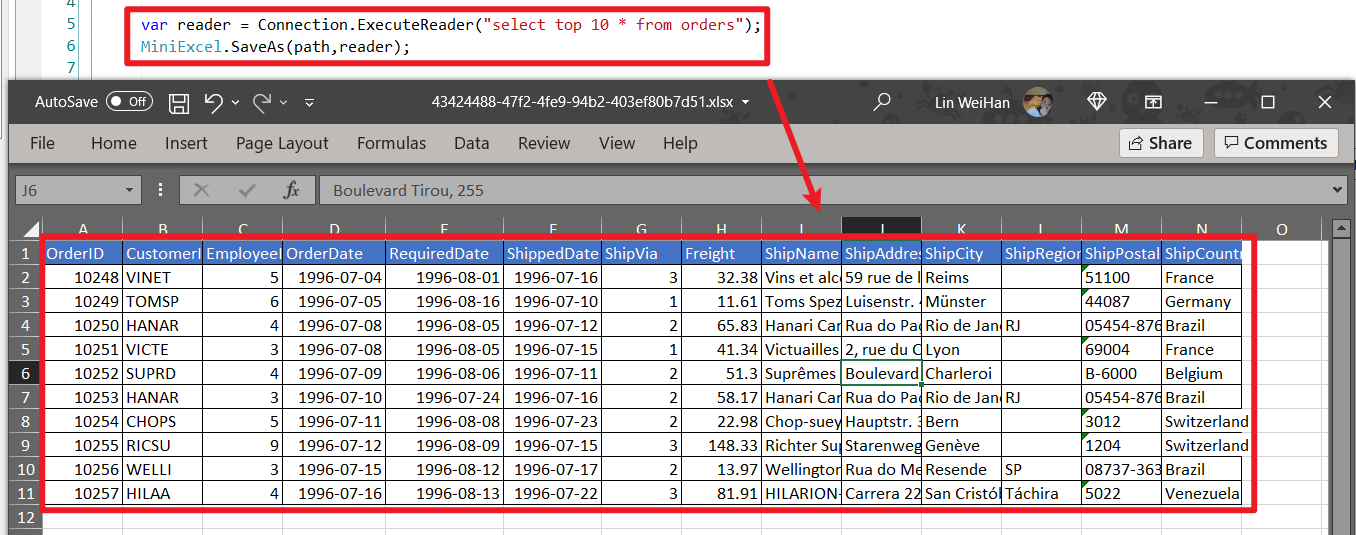
DataReader export multiple sheets (recommand by Dapper ExecuteReader)
using (var cnn = Connection)
{
cnn.Open();
var sheets = new Dictionary<string,object>();
sheets.Add("sheet1", cnn.ExecuteReader("select 1 id"));
sheets.Add("sheet2", cnn.ExecuteReader("select 2 id"));
MiniExcel.SaveAs("Demo.xlsx", sheets);
}
4. Datatable
-
Not recommended, it will load all data into memory -
DataTable use Caption for column name first, then use columname
var path = Path.Combine(Path.GetTempPath(), $"{Guid.NewGuid()}.xlsx");
var table = new DataTable();
{
table.Columns.Add("Column1", typeof(string));
table.Columns.Add("Column2", typeof(decimal));
table.Rows.Add("MiniExcel", 1);
table.Rows.Add("Github", 2);
}
MiniExcel.SaveAs(path, table);
5. Dapper Query
Not recommended, it will load all data into memory, please useExecuteReader
using (var connection = GetConnection(connectionString))
{
var rows = connection.Query(@"select 'MiniExcel' as Column1,1 as Column2 union all select 'Github',2");
MiniExcel.SaveAs(path, rows);
}
6. SaveAs to MemoryStream [Try it]
using (var stream = new MemoryStream()) //support FileStream,MemoryStream ect.
{
stream.SaveAs(values);
}
e.g : api of export excel
public IActionResult DownloadExcel()
{
var values = new[] {
new { Column1 = "MiniExcel", Column2 = 1 },
new { Column1 = "Github", Column2 = 2}
};
var memoryStream = new MemoryStream();
memoryStream.SaveAs(values);
memoryStream.Seek(0, SeekOrigin.Begin);
return new FileStreamResult(memoryStream, "application/vnd.openxmlformats-officedocument.spreadsheetml.sheet")
{
FileDownloadName = "demo.xlsx"
};
}
7. Create Multiple Sheets
// 1. Dictionary<string,object>
var users = new[] { new { Name = "Jack", Age = 25 }, new { Name = "Mike", Age = 44 } };
var department = new[] { new { ID = "01", Name = "HR" }, new { ID = "02", Name = "IT" } };
var sheets = new Dictionary<string, object>
{
["users"] = users,
["department"] = department
};
MiniExcel.SaveAs(path, sheets);
// 2. DataSet
var sheets = new DataSet();
sheets.Add(UsersDataTable);
sheets.Add(DepartmentDataTable);
//..
MiniExcel.SaveAs(path, sheets);

8. TableStyles Options
Default style
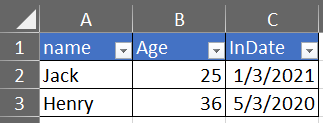
Without style configuration
var config = new OpenXmlConfiguration()
{
TableStyles = TableStyles.None
};
MiniExcel.SaveAs(path, value,configuration:config);

9. AutoFilter
Since v0.19.0 OpenXmlConfiguration.AutoFilter can en/unable AutoFilter , default value is true, and setting AutoFilter way:
MiniExcel.SaveAs(path, value, configuration: new OpenXmlConfiguration() { AutoFilter = false });
10. Create Image
var value = new[] {
new { Name="github",Image=File.ReadAllBytes(PathHelper.GetFile("images/github_logo.png"))},
new { Name="google",Image=File.ReadAllBytes(PathHelper.GetFile("images/google_logo.png"))},
new { Name="microsoft",Image=File.ReadAllBytes(PathHelper.GetFile("images/microsoft_logo.png"))},
new { Name="reddit",Image=File.ReadAllBytes(PathHelper.GetFile("images/reddit_logo.png"))},
new { Name="statck_overflow",Image=File.ReadAllBytes(PathHelper.GetFile("images/statck_overflow_logo.png"))},
};
MiniExcel.SaveAs(path, value);

11. Byte Array File Export
Since 1.22.0, when value type is byte[] then system will save file path at cell by default, and when import system can be converted to byte[]. And if you don't want to use it, you can set OpenXmlConfiguration.EnableConvertByteArray to false, it can improve the system efficiency.

Since 1.22.0, when value type is byte[] then system will save file path at cell by default, and when import system can be converted to byte[]. And if you don't want to use it, you can set OpenXmlConfiguration.EnableConvertByteArray to false, it can improve the system efficiency.

12. Merge same cells vertically
This functionality is only supported in xlsx format and merges cells vertically.
var mergedFilePath = Path.Combine(Path.GetTempPath(), $"{Guid.NewGuid().ToString()}.xlsx");
var path = @"../../../../../samples/xlsx/TestMergeSameCells.xlsx";
MiniExcel.MergeSameCells(mergedFilePath, path);
var memoryStream = new MemoryStream();
var path = @"../../../../../samples/xlsx/TestMergeSameCells.xlsx";
memoryStream.MergeSameCells(path);
File content before and after merge:
13. Skip null values
Default behaviour:
DataTable dt = new DataTable();
/* ... */
DataRow dr = dt.NewRow();
dr["Name1"] = "Somebody once";
dr["Name2"] = null;
dr["Name3"] = "told me.";
dt.Rows.Add(dr);
MiniExcel.SaveAs(@"C:\temp\Book1.xlsx", dt);

<x:row r="2">
<x:c r="A2" t ="str" s="2">
<x:v>Somebody once</x:v>
</x:c>
<x:c r="B2" t ="str" s="2">
<x:v></x:v>
</x:c>
<x:c r="C2" t ="str" s="2">
<x:v>told me.</x:v>
</x:c>
</x:row>
Result using new option:
OpenXmlConfiguration configuration = new OpenXmlConfiguration()
{
WriteNullValues = false // Default value is true.
};
MiniExcel.SaveAs(@"C:\temp\Book1.xlsx", dt, configuration: configuration);

<x:row r="2">
<x:c r="A2" t ="str" s="2">
<x:v>Somebody once</x:v>
</x:c>
<x:c r="B2" s="2"></x:c>
<x:c r="C2" t ="str" s="2">
<x:v>told me.</x:v>
</x:c>
</x:row>
Works for null and DBNull values.
Fill Data To Excel Template
- The declaration is similar to Vue template
{{variable name}}, or the collection rendering{{collection name.field name}} - Collection rendering support IEnumerable/DataTable/DapperRow
1. Basic Fill
Template:

Result:

Code:
// 1. By POCO
var value = new
{
Name = "Jack",
CreateDate = new DateTime(2021, 01, 01),
VIP = true,
Points = 123
};
MiniExcel.SaveAsByTemplate(path, templatePath, value);
// 2. By Dictionary
var value = new Dictionary<string, object>()
{
["Name"] = "Jack",
["CreateDate"] = new DateTime(2021, 01, 01),
["VIP"] = true,
["Points"] = 123
};
MiniExcel.SaveAsByTemplate(path, templatePath, value);
2. IEnumerable Data Fill
Note1: Use the first IEnumerable of the same column as the basis for filling list
Template:

Result:

Code:
//1. By POCO
var value = new
{
employees = new[] {
new {name="Jack",department="HR"},
new {name="Lisa",department="HR"},
new {name="John",department="HR"},
new {name="Mike",department="IT"},
new {name="Neo",department="IT"},
new {name="Loan",department="IT"}
}
};
MiniExcel.SaveAsByTemplate(path, templatePath, value);
//2. By Dictionary
var value = new Dictionary<string, object>()
{
["employees"] = new[] {
new {name="Jack",department="HR"},
new {name="Lisa",department="HR"},
new {name="John",department="HR"},
new {name="Mike",department="IT"},
new {name="Neo",department="IT"},
new {name="Loan",department="IT"}
}
};
MiniExcel.SaveAsByTemplate(path, templatePath, value);
3. Complex Data Fill
Note: Support multi-sheets and using same varible
Template:

Result:

// 1. By POCO
var value = new
{
title = "FooCompany",
managers = new[] {
new {name="Jack",department="HR"},
new {name="Loan",department="IT"}
},
employees = new[] {
new {name="Wade",department="HR"},
new {name="Felix",department="HR"},
new {name="Eric",department="IT"},
new {name="Keaton",department="IT"}
}
};
MiniExcel.SaveAsByTemplate(path, templatePath, value);
// 2. By Dictionary
var value = new Dictionary<string, object>()
{
["title"] = "FooCompany",
["managers"] = new[] {
new {name="Jack",department="HR"},
new {name="Loan",department="IT"}
},
["employees"] = new[] {
new {name="Wade",department="HR"},
new {name="Felix",department="HR"},
new {name="Eric",department="IT"},
new {name="Keaton",department="IT"}
}
};
MiniExcel.SaveAsByTemplate(path, templatePath, value);
4. Fill Big Data Performance
NOTE: Using IEnumerable deferred execution not ToList can save max memory usage in MiniExcel

5. Cell value auto mapping type
Template

Result

Class
public class Poco
{
public string @string { get; set; }
public int? @int { get; set; }
public decimal? @decimal { get; set; }
public double? @double { get; set; }
public DateTime? datetime { get; set; }
public bool? @bool { get; set; }
public Guid? Guid { get; set; }
}
Code
var poco = new TestIEnumerableTypePoco { @string = "string", @int = 123, @decimal = decimal.Parse("123.45"), @double = (double)123.33, @datetime = new DateTime(2021, 4, 1), @bool = true, @Guid = Guid.NewGuid() };
var value = new
{
Ts = new[] {
poco,
new TestIEnumerableTypePoco{},
null,
poco
}
};
MiniExcel.SaveAsByTemplate(path, templatePath, value);
6. Example : List Github Projects
Template

Result

Code
var projects = new[]
{
new {Name = "MiniExcel",Link="https://github.com/shps951023/MiniExcel",Star=146, CreateTime=new DateTime(2021,03,01)},
new {Name = "HtmlTableHelper",Link="https://github.com/shps951023/HtmlTableHelper",Star=16, CreateTime=new DateTime(2020,02,01)},
new {Name = "PocoClassGenerator",Link="https://github.com/shps951023/PocoClassGenerator",Star=16, CreateTime=new DateTime(2019,03,17)}
};
var value = new
{
User = "ITWeiHan",
Projects = projects,
TotalStar = projects.Sum(s => s.Star)
};
MiniExcel.SaveAsByTemplate(path, templatePath, value);
7. Grouped Data Fill
var value = new Dictionary<string, object>()
{
["employees"] = new[] {
new {name="Jack",department="HR"},
new {name="Jack",department="HR"},
new {name="John",department="HR"},
new {name="John",department="IT"},
new {name="Neo",department="IT"},
new {name="Loan",department="IT"}
}
};
await MiniExcel.SaveAsByTemplateAsync(path, templatePath, value);
1. With @group tag and with @header tag
Before
After
2. With @group tag and without @header tag
Before
After
3. Without @group tag
Before
After
8. If/ElseIf/Else Statements inside cell
Rules:
- Supports DateTime, Double, Int with ==, !=, >, >=, <, <= operators.
- Supports String with ==, != operators.
- Each statement should be new line.
- Single space should be added before and after operators.
- There shouldn't be new line inside of statements.
- Cell should be in exact format as below.
@if(name == Jack)
{{employees.name}}
@elseif(name == Neo)
Test {{employees.name}}
@else
{{employees.department}}
@endif
Before
After
9. DataTable as parameter
var managers = new DataTable();
{
managers.Columns.Add("name");
managers.Columns.Add("department");
managers.Rows.Add("Jack", "HR");
managers.Rows.Add("Loan", "IT");
}
var value = new Dictionary<string, object>()
{
["title"] = "FooCompany",
["managers"] = managers,
};
MiniExcel.SaveAsByTemplate(path, templatePath, value);
10. Other
1. Checking template parameter key
Since V1.24.0 , default ignore template missing parameter key and replace it with empty string, IgnoreTemplateParameterMissing can control throwing exception or not.
var config = new OpenXmlConfiguration()
{
IgnoreTemplateParameterMissing = false,
};
MiniExcel.SaveAsByTemplate(path, templatePath, value, config)

Excel Column Name/Index/Ignore Attribute
1. Specify the column name, column index, column ignore
Excel Example

Code
public class ExcelAttributeDemo
{
[ExcelColumnName("Column1")]
public string Test1 { get; set; }
[ExcelColumnName("Column2")]
public string Test2 { get; set; }
[ExcelIgnore]
public string Test3 { get; set; }
[ExcelColumnIndex("I")] // system will convert "I" to 8 index
public string Test4 { get; set; }
public string Test5 { get; } //wihout set will ignore
public string Test6 { get; private set; } //un-public set will ignore
[ExcelColumnIndex(3)] // start with 0
public string Test7 { get; set; }
}
var rows = MiniExcel.Query<ExcelAttributeDemo>(path).ToList();
Assert.Equal("Column1", rows[0].Test1);
Assert.Equal("Column2", rows[0].Test2);
Assert.Null(rows[0].Test3);
Assert.Equal("Test7", rows[0].Test4);
Assert.Null(rows[0].Test5);
Assert.Null(rows[0].Test6);
Assert.Equal("Test4", rows[0].Test7);
2. Custom Format (ExcelFormatAttribute)
Since V0.21.0 support class which contains ToString(string content) method format
Class
public class Dto
{
public string Name { get; set; }
[ExcelFormat("MMMM dd, yyyy")]
public DateTime InDate { get; set; }
}
Code
var value = new Dto[] {
new Issue241Dto{ Name="Jack",InDate=new DateTime(2021,01,04)},
new Issue241Dto{ Name="Henry",InDate=new DateTime(2020,04,05)},
};
MiniExcel.SaveAs(path, value);
Result
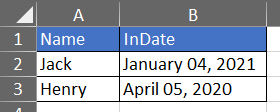
Query supports custom format conversion

3. Set Column Width(ExcelColumnWidthAttribute)
public class Dto
{
[ExcelColumnWidth(20)]
public int ID { get; set; }
[ExcelColumnWidth(15.50)]
public string Name { get; set; }
}
4. Multiple column names mapping to the same property.
public class Dto
{
[ExcelColumnName(excelColumnName:"EmployeeNo",aliases:new[] { "EmpNo","No" })]
public string Empno { get; set; }
public string Name { get; set; }
}
5. System.ComponentModel.DisplayNameAttribute = ExcelColumnName.excelColumnNameAttribute
Since 1.24.0, system supports System.ComponentModel.DisplayNameAttribute = ExcelColumnName.excelColumnNameAttribute
public class TestIssueI4TXGTDto
{
public int ID { get; set; }
public string Name { get; set; }
[DisplayName("Specification")]
public string Spc { get; set; }
[DisplayName("Unit Price")]
public decimal Up { get; set; }
}
6. ExcelColumnAttribute
Since V1.26.0, multiple attributes can be simplified like :
public class TestIssueI4ZYUUDto
{
[ExcelColumn(Name = "ID",Index =0)]
public string MyProperty { get; set; }
[ExcelColumn(Name = "CreateDate", Index = 1,Format ="yyyy-MM",Width =100)]
public DateTime MyProperty2 { get; set; }
}
7. DynamicColumnAttribute
Since V1.26.0, we can set the attributes of Column dynamically
var config = new OpenXmlConfiguration
{
DynamicColumns = new DynamicExcelColumn[] {
new DynamicExcelColumn("id"){Ignore=true},
new DynamicExcelColumn("name"){Index=1,Width=10},
new DynamicExcelColumn("createdate"){Index=0,Format="yyyy-MM-dd",Width=15},
new DynamicExcelColumn("point"){Index=2,Name="Account Point"},
}
};
var path = PathHelper.GetTempPath();
var value = new[] { new { id = 1, name = "Jack", createdate = new DateTime(2022, 04, 12) ,point = 123.456} };
MiniExcel.SaveAs(path, value, configuration: config);

Add, Delete, Update
Add
v1.28.0 support CSV insert N rows data after last row
// Origin
{
var value = new[] {
new { ID=1,Name ="Jack",InDate=new DateTime(2021,01,03)},
new { ID=2,Name ="Henry",InDate=new DateTime(2020,05,03)},
};
MiniExcel.SaveAs(path, value);
}
// Insert 1 rows after last
{
var value = new { ID=3,Name = "Mike", InDate = new DateTime(2021, 04, 23) };
MiniExcel.Insert(path, value);
}
// Insert N rows after last
{
var value = new[] {
new { ID=4,Name ="Frank",InDate=new DateTime(2021,06,07)},
new { ID=5,Name ="Gloria",InDate=new DateTime(2022,05,03)},
};
MiniExcel.Insert(path, value);
}

Delete(waiting)
Update(waiting)
Excel Type Auto Check
- MiniExcel will check whether it is xlsx or csv based on the
file extensionby default, but there may be inaccuracy, please specify it manually. - Stream cannot be know from which excel, please specify it manually.
stream.SaveAs(excelType:ExcelType.CSV);
//or
stream.SaveAs(excelType:ExcelType.XLSX);
//or
stream.Query(excelType:ExcelType.CSV);
//or
stream.Query(excelType:ExcelType.XLSX);
CSV
Note
- Default return
stringtype, and value will not be converted to numbers or datetime, unless the type is defined by strong typing generic.
Custom separator
The default is , as the separator, you can modify the Seperator property for customization
var config = new MiniExcelLibs.Csv.CsvConfiguration()
{
Seperator=';'
};
MiniExcel.SaveAs(path, values,configuration: config);
Since V1.30.1 support function to custom separator (thanks @hyzx86)
var config = new CsvConfiguration()
{
SplitFn = (row) => Regex.Split(row, $"[\t,](?=(?:[^\"]|\"[^\"]*\")*$)")
.Select(s => Regex.Replace(s.Replace("\"\"", "\""), "^\"|\"$", "")).ToArray()
};
var rows = MiniExcel.Query(path, configuration: config).ToList();
Custom line break
The default is \r\n as the newline character, you can modify the NewLine property for customization
var config = new MiniExcelLibs.Csv.CsvConfiguration()
{
NewLine='\n'
};
MiniExcel.SaveAs(path, values,configuration: config);
Custom coding
- The default encoding is "Detect Encoding From Byte Order Marks" (detectEncodingFromByteOrderMarks: true)
- f you have custom encoding requirements, please modify the StreamReaderFunc / StreamWriterFunc property
// Read
var config = new MiniExcelLibs.Csv.CsvConfiguration()
{
StreamReaderFunc = (stream) => new StreamReader(stream,Encoding.GetEncoding("gb2312"))
};
var rows = MiniExcel.Query(path, true,excelType:ExcelType.CSV,configuration: config);
// Write
var config = new MiniExcelLibs.Csv.CsvConfiguration()
{
StreamWriterFunc = (stream) => new StreamWriter(stream, Encoding.GetEncoding("gb2312"))
};
MiniExcel.SaveAs(path, value,excelType:ExcelType.CSV, configuration: config);
DataReader
1. GetReader
Since 1.23.0, you can GetDataReader
using (var reader = MiniExcel.GetReader(path,true))
{
while (reader.Read())
{
for (int i = 0; i < reader.FieldCount; i++)
{
var value = reader.GetValue(i);
}
}
}
Async
- v0.17.0 support Async (thanks isdaniel ( SHIH,BING-SIOU)](https://github.com/isdaniel))
public static Task SaveAsAsync(string path, object value, bool printHeader = true, string sheetName = "Sheet1", ExcelType excelType = ExcelType.UNKNOWN, IConfiguration configuration = null)
public static Task SaveAsAsync(this Stream stream, object value, bool printHeader = true, string sheetName = "Sheet1", ExcelType excelType = ExcelType.XLSX, IConfiguration configuration = null)
public static Task<IEnumerable<dynamic>> QueryAsync(string path, bool useHeaderRow = false, string sheetName = null, ExcelType excelType = ExcelType.UNKNOWN, string startCell = "A1", IConfiguration configuration = null)
public static Task<IEnumerable<T>> QueryAsync<T>(this Stream stream, string sheetName = null, ExcelType excelType = ExcelType.UNKNOWN, string startCell = "A1", IConfiguration configuration = null) where T : class, new()
public static Task<IEnumerable<T>> QueryAsync<T>(string path, string sheetName = null, ExcelType excelType = ExcelType.UNKNOWN, string startCell = "A1", IConfiguration configuration = null) where T : class, new()
public static Task<IEnumerable<IDictionary<string, object>>> QueryAsync(this Stream stream, bool useHeaderRow = false, string sheetName = null, ExcelType excelType = ExcelType.UNKNOWN, string startCell = "A1", IConfiguration configuration = null)
public static Task SaveAsByTemplateAsync(this Stream stream, string templatePath, object value)
public static Task SaveAsByTemplateAsync(this Stream stream, byte[] templateBytes, object value)
public static Task SaveAsByTemplateAsync(string path, string templatePath, object value)
public static Task SaveAsByTemplateAsync(string path, byte[] templateBytes, object value)
public static Task<DataTable> QueryAsDataTableAsync(string path, bool useHeaderRow = true, string sheetName = null, ExcelType excelType = ExcelType.UNKNOWN, string startCell = "A1", IConfiguration configuration = null)
- v1.25.0 support
cancellationToken。
Others
1. Enum
Be sure excel & property name same, system will auto mapping (case insensitive)

Since V0.18.0 support Enum Description
public class Dto
{
public string Name { get; set; }
public I49RYZUserType UserType { get; set; }
}
public enum Type
{
[Description("General User")]
V1,
[Description("General Administrator")]
V2,
[Description("Super Administrator")]
V3
}

Since 1.30.0 version support excel Description to Enum , thanks @KaneLeung
2. Convert CSV to XLSX or Convert XLSX to CSV
MiniExcel.ConvertXlsxToCsv(xlsxPath, csvPath);
MiniExcel.ConvertXlsxToCsv(xlsxStream, csvStream);
MiniExcel.ConvertXlsxToCsv(csvPath, xlsxPath);
MiniExcel.ConvertXlsxToCsv(csvStream, xlsxStream);
3. Custom CultureInfo
Since 1.22.0, you can custom CultureInfo like below, system default CultureInfo.InvariantCulture.
var config = new CsvConfiguration()
{
Culture = new CultureInfo("fr-FR"),
};
MiniExcel.SaveAs(path, value, configuration: config);
// or
MiniExcel.Query(path, configuration: config);
4. Custom Buffer Size
public abstract class Configuration : IConfiguration
{
public int BufferSize { get; set; } = 1024 * 512;
}
5. FastMode
System will not control memory, but you can get faster save speed.
var config = new OpenXmlConfiguration() { FastMode = true };
MiniExcel.SaveAs(path, reader,configuration:config);
Examples:
1. SQLite & Dapper Large Size File SQL Insert Avoid OOM
note : please don't call ToList/ToArray methods after Query, it'll load all data into memory
using (var connection = new SQLiteConnection(connectionString))
{
connection.Open();
using (var transaction = connection.BeginTransaction())
using (var stream = File.OpenRead(path))
{
var rows = stream.Query();
foreach (var row in rows)
connection.Execute("insert into T (A,B) values (@A,@B)", new { row.A, row.B }, transaction: transaction);
transaction.Commit();
}
}
performance:
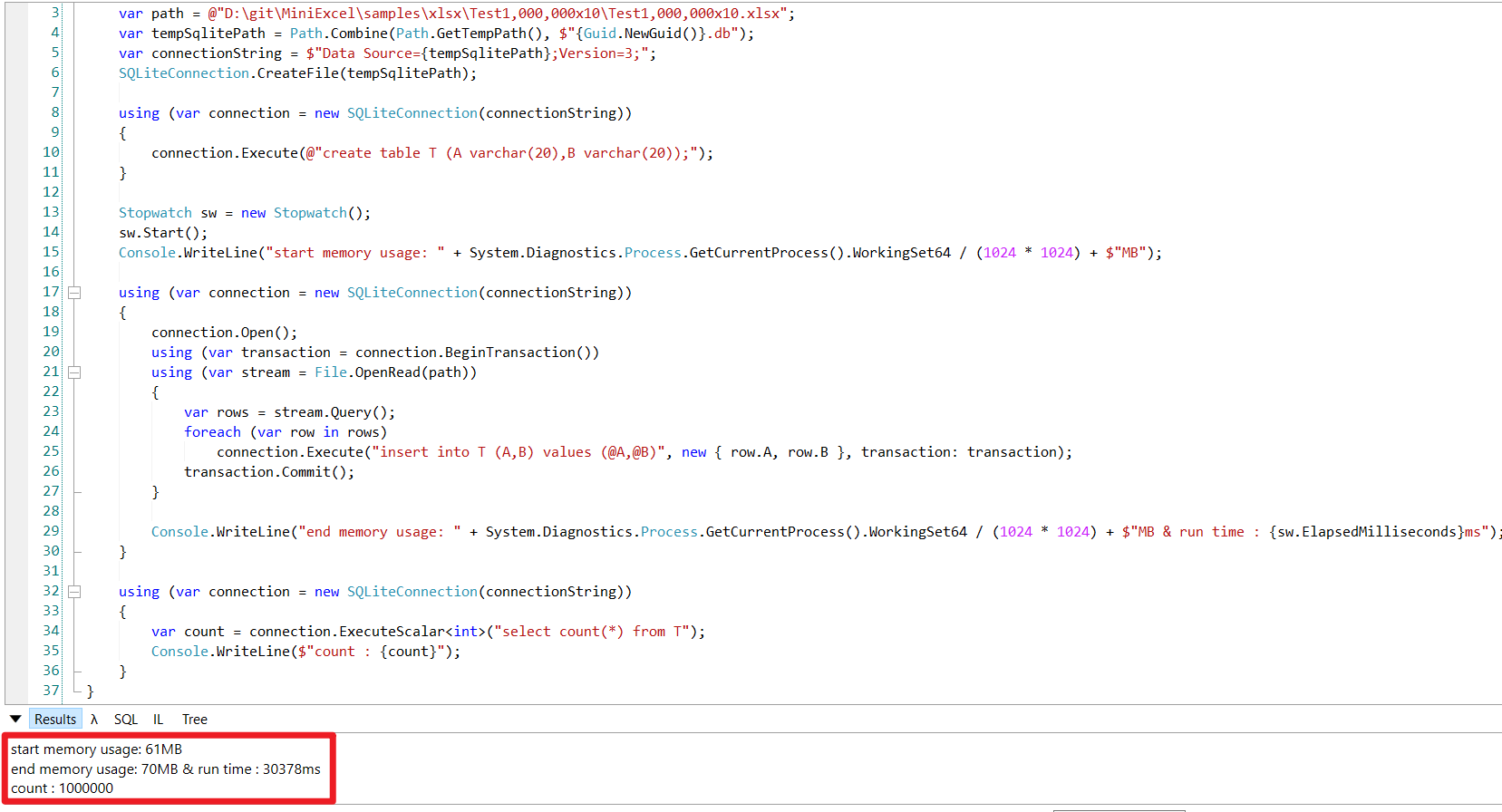
2. ASP.NET Core 3.1 or MVC 5 Download/Upload Excel Xlsx API Demo Try it
public class ApiController : Controller
{
public IActionResult Index()
{
return new ContentResult
{
ContentType = "text/html",
StatusCode = (int)HttpStatusCode.OK,
Content = @"<html><body>
<a href='api/DownloadExcel'>DownloadExcel</a><br>
<a href='api/DownloadExcelFromTemplatePath'>DownloadExcelFromTemplatePath</a><br>
<a href='api/DownloadExcelFromTemplateBytes'>DownloadExcelFromTemplateBytes</a><br>
<p>Upload Excel</p>
<form method='post' enctype='multipart/form-data' action='/api/uploadexcel'>
<input type='file' name='excel'> <br>
<input type='submit' >
</form>
</body></html>"
};
}
public IActionResult DownloadExcel()
{
var values = new[] {
new { Column1 = "MiniExcel", Column2 = 1 },
new { Column1 = "Github", Column2 = 2}
};
var memoryStream = new MemoryStream();
memoryStream.SaveAs(values);
memoryStream.Seek(0, SeekOrigin.Begin);
return new FileStreamResult(memoryStream, "application/vnd.openxmlformats-officedocument.spreadsheetml.sheet")
{
FileDownloadName = "demo.xlsx"
};
}
public IActionResult DownloadExcelFromTemplatePath()
{
string templatePath = "TestTemplateComplex.xlsx";
Dictionary<string, object> value = new Dictionary<string, object>()
{
["title"] = "FooCompany",
["managers"] = new[] {
new {name="Jack",department="HR"},
new {name="Loan",department="IT"}
},
["employees"] = new[] {
new {name="Wade",department="HR"},
new {name="Felix",department="HR"},
new {name="Eric",department="IT"},
new {name="Keaton",department="IT"}
}
};
MemoryStream memoryStream = new MemoryStream();
memoryStream.SaveAsByTemplate(templatePath, value);
memoryStream.Seek(0, SeekOrigin.Begin);
return new FileStreamResult(memoryStream, "application/vnd.openxmlformats-officedocument.spreadsheetml.sheet")
{
FileDownloadName = "demo.xlsx"
};
}
private static Dictionary<string, Byte[]> TemplateBytesCache = new Dictionary<string, byte[]>();
static ApiController()
{
string templatePath = "TestTemplateComplex.xlsx";
byte[] bytes = System.IO.File.ReadAllBytes(templatePath);
TemplateBytesCache.Add(templatePath, bytes);
}
public IActionResult DownloadExcelFromTemplateBytes()
{
byte[] bytes = TemplateBytesCache["TestTemplateComplex.xlsx"];
Dictionary<string, object> value = new Dictionary<string, object>()
{
["title"] = "FooCompany",
["managers"] = new[] {
new {name="Jack",department="HR"},
new {name="Loan",department="IT"}
},
["employees"] = new[] {
new {name="Wade",department="HR"},
new {name="Felix",department="HR"},
new {name="Eric",department="IT"},
new {name="Keaton",department="IT"}
}
};
MemoryStream memoryStream = new MemoryStream();
memoryStream.SaveAsByTemplate(bytes, value);
memoryStream.Seek(0, SeekOrigin.Begin);
return new FileStreamResult(memoryStream, "application/vnd.openxmlformats-officedocument.spreadsheetml.sheet")
{
FileDownloadName = "demo.xlsx"
};
}
public IActionResult UploadExcel(IFormFile excel)
{
var stream = new MemoryStream();
excel.CopyTo(stream);
foreach (var item in stream.Query(true))
{
// do your logic etc.
}
return Ok("File uploaded successfully");
}
}
3. Paging Query
void Main()
{
var rows = MiniExcel.Query(path);
Console.WriteLine("==== No.1 Page ====");
Console.WriteLine(Page(rows,pageSize:3,page:1));
Console.WriteLine("==== No.50 Page ====");
Console.WriteLine(Page(rows,pageSize:3,page:50));
Console.WriteLine("==== No.5000 Page ====");
Console.WriteLine(Page(rows,pageSize:3,page:5000));
}
public static IEnumerable<T> Page<T>(IEnumerable<T> en, int pageSize, int page)
{
return en.Skip(page * pageSize).Take(pageSize);
}

4. WebForm export Excel by memorystream
var fileName = "Demo.xlsx";
var sheetName = "Sheet1";
HttpResponse response = HttpContext.Current.Response;
response.Clear();
response.ContentType = "application/vnd.openxmlformats-officedocument.spreadsheetml.sheet";
response.AddHeader("Content-Disposition", $"attachment;filename=\"{fileName}\"");
var values = new[] {
new { Column1 = "MiniExcel", Column2 = 1 },
new { Column1 = "Github", Column2 = 2}
};
var memoryStream = new MemoryStream();
memoryStream.SaveAs(values, sheetName: sheetName);
memoryStream.Seek(0, SeekOrigin.Begin);
memoryStream.CopyTo(Response.OutputStream);
response.End();
5. Dynamic i18n multi-language and role authority management
Like the example, create a method to handle i18n and permission management, and use yield return to return IEnumerable<Dictionary<string, object>> to achieve dynamic and low-memory processing effects
void Main()
{
var value = new Order[] {
new Order(){OrderNo = "SO01",CustomerID="C001",ProductID="P001",Qty=100,Amt=500},
new Order(){OrderNo = "SO02",CustomerID="C002",ProductID="P002",Qty=300,Amt=400},
};
Console.WriteLine("en-Us and Sales role");
{
var path = Path.GetTempPath() + Guid.NewGuid() + ".xlsx";
var lang = "en-US";
var role = "Sales";
MiniExcel.SaveAs(path, GetOrders(lang, role, value));
MiniExcel.Query(path, true).Dump();
}
Console.WriteLine("zh-CN and PMC role");
{
var path = Path.GetTempPath() + Guid.NewGuid() + ".xlsx";
var lang = "zh-CN";
var role = "PMC";
MiniExcel.SaveAs(path, GetOrders(lang, role, value));
MiniExcel.Query(path, true).Dump();
}
}
private IEnumerable<Dictionary<string, object>> GetOrders(string lang, string role, Order[] orders)
{
foreach (var order in orders)
{
var newOrder = new Dictionary<string, object>();
if (lang == "zh-CN")
{
newOrder.Add("客户编号", order.CustomerID);
newOrder.Add("订单编号", order.OrderNo);
newOrder.Add("产品编号", order.ProductID);
newOrder.Add("数量", order.Qty);
if (role == "Sales")
newOrder.Add("价格", order.Amt);
yield return newOrder;
}
else if (lang == "en-US")
{
newOrder.Add("Customer ID", order.CustomerID);
newOrder.Add("Order No", order.OrderNo);
newOrder.Add("Product ID", order.ProductID);
newOrder.Add("Quantity", order.Qty);
if (role == "Sales")
newOrder.Add("Amount", order.Amt);
yield return newOrder;
}
else
{
throw new InvalidDataException($"lang {lang} wrong");
}
}
}
public class Order
{
public string OrderNo { get; set; }
public string CustomerID { get; set; }
public decimal Qty { get; set; }
public string ProductID { get; set; }
public decimal Amt { get; set; }
}
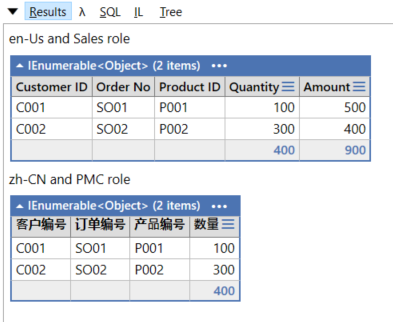
FAQ
Q: Excel header title not equal class property name, how to mapping?
A. Please use ExcelColumnName attribute
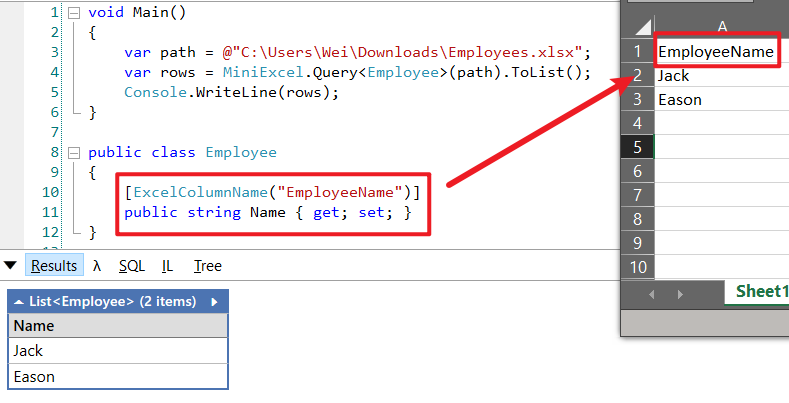
Q. How to query or export multiple-sheets?
A. GetSheetNames method with Query sheetName parameter.
var sheets = MiniExcel.GetSheetNames(path);
foreach (var sheet in sheets)
{
Console.WriteLine($"sheet name : {sheet} ");
var rows = MiniExcel.Query(path,useHeaderRow:true,sheetName:sheet);
Console.WriteLine(rows);
}

Q. Whether to use Count will load all data into the memory?
No, the image test has 1 million rows*10 columns of data, the maximum memory usage is <60MB, and it takes 13.65 seconds

Q. How does Query use integer indexs?
The default index of Query is the string Key: A,B,C.... If you want to change to numeric index, please create the following method to convert
void Main()
{
var path = @"D:\git\MiniExcel\samples\xlsx\TestTypeMapping.xlsx";
var rows = MiniExcel.Query(path,true);
foreach (var r in ConvertToIntIndexRows(rows))
{
Console.Write($"column 0 : {r[0]} ,column 1 : {r[1]}");
Console.WriteLine();
}
}
private IEnumerable<Dictionary<int, object>> ConvertToIntIndexRows(IEnumerable<object> rows)
{
ICollection<string> keys = null;
var isFirst = true;
foreach (IDictionary<string,object> r in rows)
{
if(isFirst)
{
keys = r.Keys;
isFirst = false;
}
var dic = new Dictionary<int, object>();
var index = 0;
foreach (var key in keys)
dic[index++] = r[key];
yield return dic;
}
}
Q. No title empty excel is generated when the value is empty when exporting Excel
Because MiniExcel uses a logic similar to JSON.NET to dynamically get type from values to simplify API operations, type cannot be knew without data. You can check issue #133 for understanding.
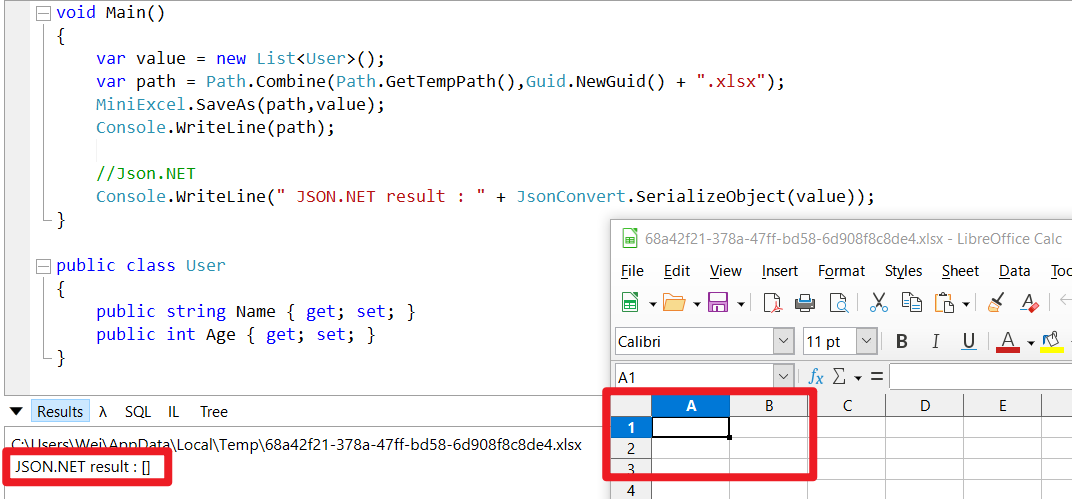
Strong type & DataTable will generate headers, but Dictionary are still empty Excel
Q. How to stop the foreach when blank row?
MiniExcel can be used with LINQ TakeWhile to stop foreach iterator.

Q. How to remove empty rows?

IEnumerable :
public static IEnumerable<dynamic> QueryWithoutEmptyRow(Stream stream, bool useHeaderRow, string sheetName, ExcelType excelType, string startCell, IConfiguration configuration)
{
var rows = stream.Query(useHeaderRow,sheetName,excelType,startCell,configuration);
foreach (IDictionary<string,object> row in rows)
{
if(row.Keys.Any(key=>row[key]!=null))
yield return row;
}
}
DataTable :
public static DataTable QueryAsDataTableWithoutEmptyRow(Stream stream, bool useHeaderRow, string sheetName, ExcelType excelType, string startCell, IConfiguration configuration)
{
if (sheetName == null && excelType != ExcelType.CSV) /*Issue #279*/
sheetName = stream.GetSheetNames().First();
var dt = new DataTable(sheetName);
var first = true;
var rows = stream.Query(useHeaderRow,sheetName,excelType,startCell,configuration);
foreach (IDictionary<string, object> row in rows)
{
if (first)
{
foreach (var key in row.Keys)
{
var column = new DataColumn(key, typeof(object)) { Caption = key };
dt.Columns.Add(column);
}
dt.BeginLoadData();
first = false;
}
var newRow = dt.NewRow();
var isNull=true;
foreach (var key in row.Keys)
{
var _v = row[key];
if(_v!=null)
isNull = false;
newRow[key] = _v;
}
if(!isNull)
dt.Rows.Add(newRow);
}
dt.EndLoadData();
return dt;
}
Q. How SaveAs(path,value) to replace exists file and without throwing "The file ...xlsx already exists error"
Please use Stream class to custom file creating logic, e.g:
using (var stream = File.Create("Demo.xlsx"))
MiniExcel.SaveAs(stream,value);
or, since V1.25.0, SaveAs support overwriteFile parameter for enable/unable overwriting exist file
MiniExcel.SaveAs(path, value, overwriteFile: true);
Limitations and caveats
- Not support xls and encrypted file now
- xlsm only support Query
Reference
ExcelDataReader / ClosedXML / Dapper / ExcelNumberFormat
Thanks
Jetbrains

Thanks for providing a free All product IDE for this project (License)
Contributors
此处可能存在不合适展示的内容,页面不予展示。您可通过相关编辑功能自查并修改。
如您确认内容无涉及 不当用语 / 纯广告导流 / 暴力 / 低俗色情 / 侵权 / 盗版 / 虚假 / 无价值内容或违法国家有关法律法规的内容,可点击提交进行申诉,我们将尽快为您处理。



